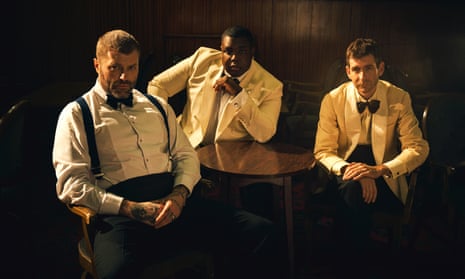Jacob Lusk is getting a kick out of being the singer in Gabriels, the soulful, cinematic trio whose scant handful of London club shows this autumn were the buzziest gigs of the season. “This is the most authentic myself I’ve ever been,” he says down the phone from his home in California. “I can do whatever I wanna do, wear whatever I wanna wear, be who I actually am. I’m embracing me, more than I ever have before.”
He is being embraced in return. At those shows, Gabriels were greeted with a fervour befitting Lusk’s own roots in spiritual music. It felt like watching a first kiss, but between a band and an audience. “That’s not a bad analogy. To be honest, it seemed more communal than anything. The audience gave us quite a bit of energy as well, so it felt more like a love fest than a show. ‘Hey, we’re all here together, let’s have this moment together,’ more than us presenting our wares.”
The beginnings of Gabriels lie five years ago, when the choir Lusk was directing was hired to sing for a film project Ryan Hope and Ari Balouzian were working on. The three became friends, and started batting around musical ideas together. They didn’t hit on their sound – one that is woody and rich, steeped in Black American musical history, restrained but hugely emotional – until they wrote the track Loyalty, initially for a Prada ad in 2018. “That was the first time we were: ‘Oh, wow, this is our thing here.’ And then we kept writing and recording in that way and the songs came really quickly. It’s just an intersection of all the things we love and all the things we are.”
There have been a series of releases since – an album is due late next year – but it was Love and Hate in a Different Time, released at the very end of 2020, that really flew. Elton John lavished his praise on it, a song that was both melancholy and ecstatic, and it was the arms-aloft highlight of those London shows. On stage, Lusk’s voice went from yearning to preaching, from whispering to shrieking, from an earthy bass to a soaring falsetto: his is one of the most spectacular voices you will hear this year. Yet for all the testifying, for many years he was resentful of being tagged a gospel singer.
He had grown up in the Apostolic church, and was forbidden to listen to the radio – his points of reference were gospel crossover music, such as the Winans, and the jazz he was allowed to listen to at home. Then, in 2011, he was a contestant on American Idol, subject to a new set of restrictions. Here, his gospel roots were “a bad thing: you’re an R&B singer, and you’re singing about sex and love, so you can’t embrace being a Christian, too. There were all these rules and things you couldn’t do.” Gabriels, though, is “the complete opposite”.
This next year is going to see the trio fly. Those who attended the London shows left convinced they had seen one of 2022’s superstar acts, and surely the word-of-mouth hit at this summer’s festivals. That’s something Lusk takes entirely in his stride. “I want 30bn Grammys!” he says. “I want to go five times quadruple platinum. I want to play Glastonbury. I want to play Wembley. I want to do it all. But now I’m a lot more appreciative of it, and I’ve realised it’s about sharing and having moments with people. It’s not all about me.”

Comments (…)
Sign in or create your Guardian account to join the discussion